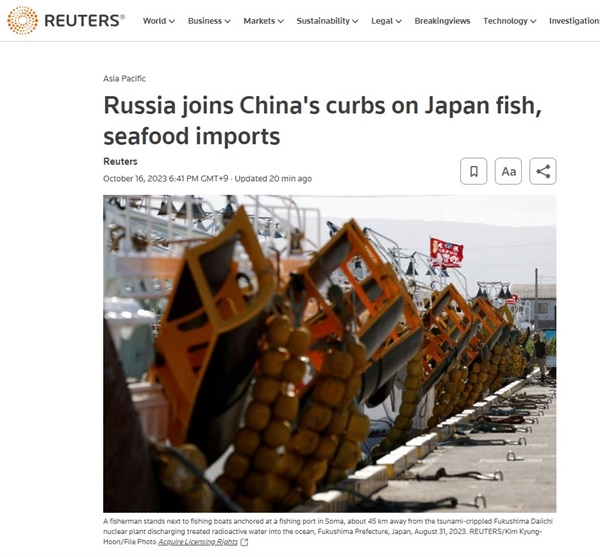
ⓒ Reuters reports
Russia has decided to ban all imports of Japanese seafood following China.
According to Reuters on the 16th (local time), Russia’s quarantine authority, the Federal Veterinary and Plant Hygiene Supervision Agency (Rosselhoznadzor), said it would “join China’s temporary restrictions on fish and seafood imports from Japan from October 16, 2023.
Russia’s quarantine authorities said the measures were “preventive measures,” adding that “restrictions will remain in place until thorough and solid information is available to verify the safety of fisheries products.”
Japan’s Ministry of Agriculture, Forestry and Fisheries said, “It is unfair and regrettable that it was decided without a scientific basis,” and added, “We will consult with each ministry to demand withdrawal,” Kyodo News reported.
According to Russian authorities, 118 tons of marine products were imported by Russia from January to September this year.
Six days after discussing the safety of contaminated water between the relevant ministries of the two countries
Russia’s total ban on imports came about three weeks after the Russian quarantine authorities said on the 26th of last month, “We are considering whether to participate in Chinese sanctions on imports of Japanese seafood at a time when there is a possibility of radioactive contamination caused by the discharge of contaminated water.”
At the time, Russian authorities said, “We asked the Japanese government to submit information on radioactive material inspections of Japanese fisheries products by October 16,” adding, “The final decision will be made after consultation with Japan.”
At Russia’s proposal on the 10th, the Japanese Ministry of Foreign Affairs, the Ministry of Agriculture, Forestry and Fisheries, the Fisheries Agency, and the Nuclear Regulatory Agency discussed the safety of Fukushima radioactive water discharge among related ministries, including the Federal Veterinary and Plant Hygiene Supervisory Service and the National Fisheries and Aquaculture Safety Center.
At the time, the Japanese government said, “The safety of Japanese fisheries products was explained based on scientific grounds,” but the Japanese government’s explanation was interpreted as failing to meet the Russian authorities’ expectations, as it eventually banned imports of Japanese fisheries products in time for Russia to submit information.
Earlier this month, he criticized Japan for “requesting information on pollutant water, but not providing it.”
Meanwhile, Russia criticized Japan earlier this month for not receiving complete information on the contaminated water discharged from the Fukushima nuclear power plant.
Russia and China have repeatedly urged Japan to provide all stakeholders with transparent and complete access to all information on the discharge of contaminated water from the Fukushima nuclear power plant, Russian Foreign Ministry spokeswoman Maria Zakharova said on the 4th.
“But Japan did not act like that,” Zakharova said. Japan failed to respond appropriately to the problem and failed to guarantee that there was no risk from discharge, including long-term risks, he pointed out.
“If Japan stops discharging its waste into the world’s oceans, Russia’s concerns will be resolved immediately,” Zakharova said, adding that China also expressed the same view.
SOPHIA KIM
US ASIA JOURNAL



